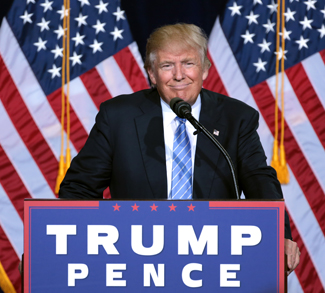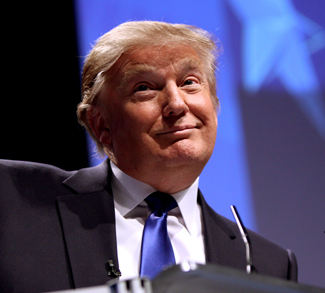Donald Trump’s recent views on US foreign policy have generated a lot of anxiety and outrage among different political actors in the world and in the U.S. Unhinged, heretical, and dangerous are just a few adjectives used in America to describe Trump’s comments, quite heavy words indeed, even in the context of a heated U.S. presidential campaign.
Beyond a blunt (sometimes amusing), untidy and no-nonsense style, and rhetoric un-rigorous in detail, Trump believes in strongly refocusing American policy to address what he sees as the country’s grave shortcomings (the monumental and growing deficit, the loss of quality jobs to overseas competition, and crumbling infrastructure). He perceives a dangerous overextension of American military power overseas and the need to have a fairer sharing of defense spending and efforts with traditional allies in Asia Pacific and Europe. A potential structural change or even disengagement from the existing alliances if that sharing does not become more equal is one of Trump’s conclusions on policies that may follow. Trump’s position on NATO, nuclear weaponry, and the Middle East are inferences of these main concerns.
Trump’s worries about US weakness are by no means original and are shared widely across the American political spectrum. It can also be argued that he is just waving openly, i.e. undiplomatically, what he thinks are the obvious maneuvering options and policies needed to achieve change.
What is quite revealing and perhaps unique, is Trump’s full disengagement with the notion that morality (e.g., fight for democracy, freedom and human rights) should continue underpinning US foreign policy. On this matter, the Middle East lessons from the last decade seems to have put a brake on these beliefs even among politicians who once had faith in the ‘responsibility to protect’ concept.
Since the end of World War II, one of the pillars of US foreign policy has been to take a leading role in the defense of its allies. This played very well in the context, for instance, of Japan’s reluctance to arm itself and on post-war fears of a new (albeit divided) Germany becoming again a military player. Conveniently, the U.S. not only led the defense of its allies in Western Europe and Asia Pacific but also took the heavier burden financially.
Obama’s and Trump’s thinking on the Middle East is also a good example of this coincidence as they agree on the declining economic importance of Middle Eastern oil, the main if not the only reason for the region’s strategic validity to the U.S.
As the rivalry with the Soviet Union grew, US foreign policy also took not only an ideological but also a moral undertone. This was partly a symbiotic response to the role played by the Soviet Union and China in expanding their world influence through the support of indigenous Marxist groups. From Kennedy’s Alliance for Progress to Reagan’s support for the earlier version of today’s Islamic fundamentalists in Afghanistan in the name of freedom, U.S. political leadership across party lines more or less believed and wanted the world to believe that their political actions were based, beyond protecting US interests, mostly if not always on moral grounds higher than their adversaries’. Gradually, reality prompted a growing collision between genuine US interests and morally driven responses. US foreign policy should be, or ultimately will find itself being, intrinsically amoral, as it should be based mainly on raison d’état, as is now the case with America’s main rivals and competitors, namely China and Russia. Only history will tell conclusively, but U.S. led morality applied to foreign policy does not seem to have had better results nor surpasses a higher ethical benchmark than, for instance, Athens’ promotion of democracy at the time of the Peloponnesian War or later on Rome’s so-called defense of liberty on behalf of the ailing Greek cities.
Of course Trump’s judgement on likely courses of action (namely a potential restructuring or even demise of NATO and allowing or even pressing America’s allies to have their own nuclear arsenals) has inevitably caused alarm and strong opposition. Over the decades, US policy has created convenient business models for a wide range of players, including NGOs, Washington-based think tanks and above all defense-related contractors. Some of these players, characterized in the 1950s by Dwight Eisenhower as the ‘military-industrial complex’ and nowadays more mildly by Obama as the ‘Washington book,’ have developed significant influence on US foreign policy for their own interests as any informed person knows.
The recent publication in The Atlantic of Barack Obama’s views on foreign policy shows remarkably how close he is to Donald Trump’s position in many respects. For instance, characterizing China as the main competitor of the U.S. and, therefore, a main priority in foreign policy is of course nothing new and is shared equally by both of them. It is more revealing that both believe that the Ukraine, for instance, is far more important to Russia than to the U.S., an issue on which Obama’s thoughts appear even more fatalistic than Trump’s.
Obama’s and Trump’s thinking on the Middle East is also a good example of this coincidence as they agree on the declining economic importance of Middle Eastern oil, the main if not the only reason for the region’s strategic validity to the U.S. The belief that Saudi Arabia is an autocratic and doubtful ally, has been a financial supporter of fundamentalism in the Muslim world and has diminishing economic relevance to the U.S. comes from Obama, not from Donald Trump. That the al-Saud dynasty has limited prospects of survival without U.S. support, as mentioned by Donald Trump, seems to be just a corollary of Obama’s assessment.
Another area of coincidence is the growing proliferation of ‘free-riders’ on the back of US defense spending, a characterization used by Obama, not by Trump. Again, suggesting diminishing spending or pulling out of defense commitments, as proposed by Trump, would appear to be a plausible course of action to consider if this imbalance is not corrected.
In light of the colossal errors of American foreign policy in the Middle East, mainly since Iraq’s second invasion, it should not surprise that in this presidential race the argument that Donald Trump is a neophyte in international politics playing against more experienced rivals does not seem to be compelling enough among the American public to dismiss him entirely. His sarcastic comment that U.S. politicians in charge of foreign policy (after Operation Desert Storm) would have done better doing nothing, goes well in the minds of many, particularly as we find out how mistakes were made (in the case of Iraq) or almost made (in the case of Syria), based on non-conclusive intelligence. Even more compelling is Obama’s surprise at the role of tribalism in the Middle East, and Libya in particular, a fundamental fact that seems to have been ignored and that any foreign policy operator in that region should have known before hand. So many wonder what does experience bring to the table in light of these catastrophic blunders.
Whether or not Trump will be in a position to implement his convictions is of course unknown at this stage. But irrespective of what happens in the Republican National Convention in July or more decisively in the U.S. presidential election in November, this foreign policy debate is quite healthy and will inevitably continue, as long as the root causes requiring policy change are still there.
The opinions, beliefs, and viewpoints expressed by the authors are theirs alone and don’t reflect any official position of Geopoliticalmonitor.com.




